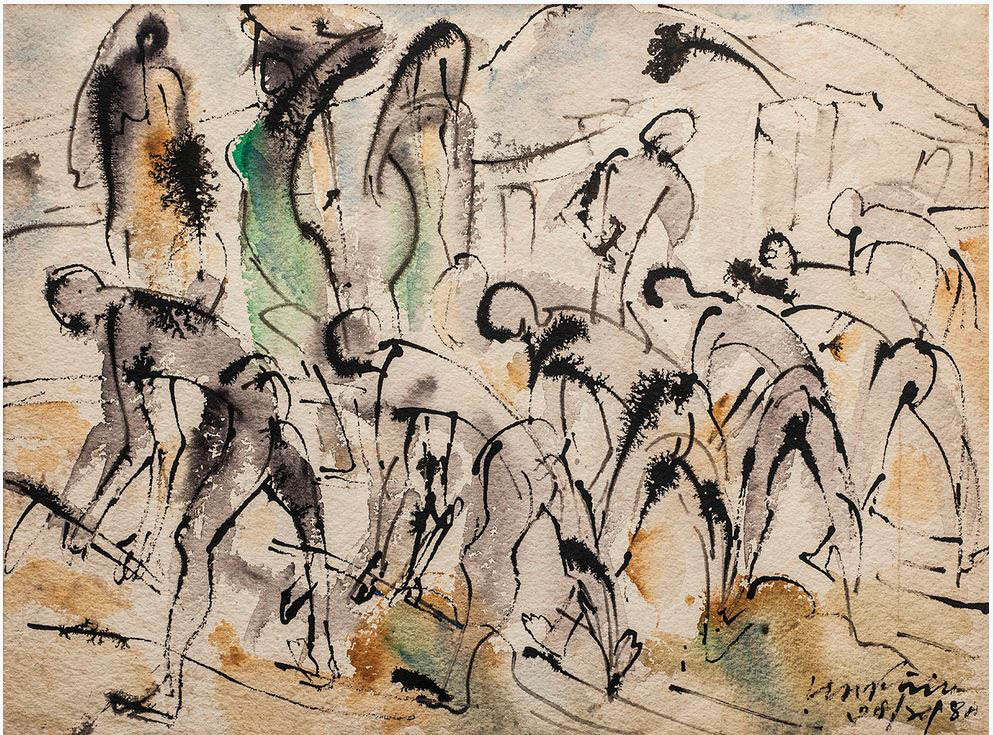Two Poems
by Ankur Betageri (May 2018)
Untitled, Ramkinkar Baij, 1948
The Brown Colonizer
—Abbé Sieyès, What is the Third Estate?
n print the colonizer is always white.
When he struts the streets, stunning everyone
into silence, the brown colonizer is without a name.
Whites and Muslims are marauders, he says.
The British Raj was a ghastly age.
A continual textual rain about its injuries
creates lightning flashes of white man’s menace.
And behind this immaculate screen of whiteness
the brown vampire’s silhouette can be seen
sucking off, quietly, the blood of innocents.
When the attacker becomes the postcolonial victim
the real victim becomes invisible
and the attacker unrecognizable
and thus is the brown empire sustained.
You can tell a brown colonizer by what he says:
He always asks you to take off the ‘western eyeglass’
science and reason, he says, are imperialist tools
the Gita, for him, is the path to liberation
and modernity, he croaks, is a western degeneration
but if reality is also for him an illusion-web
be sure you are dealing with the empire’s very head.
Just smile and smile and get away as quickly as you can
sharpen your knife, wait for the opportune moment.
The Postcolonial Diva Speaks
It is we, the English-knowing men, that have enslaved India. The curse of the nation will rest not upon the English but upon us.
—M.K. Gandhi, Hind-Swaraj
plug my ears & scream in their faces:
Can the subaltern speak?
Who has the right to speech?
Who has the gift of speech?
The subaltern cannot speak.
black
I will speak for her
lean in your microphones, turn your cameras
bring them close to my face, capture my feminine grace
admire my handloom saree, my handicrafts necklace—
Why aren’t you clapping? Didn’t you notice? —I quoted Hegel
in German—corrected a mistranslation of Marx?
And my translation of Derri-da—eta asadhoron na?
Did you get all the allusions in my essay? Of course, I am not defending sati!
What? You read it ten times but couldn’t figure out
“what I am trying to say”? For one thing: I write to play
not to “say” anything—everything there’s to say
has been “said” by Said, I am here to pro-ble-ma-tize—
The speaking for, the power one arrogates to oneself
how no one does that adequately—other than me—
What is important is that we continue the debates of
carry their legacy forward—not cut ourselves off
from that past because of colonial destruction
and she is speechless because she is powerless
and because she is powerless she is spoken for, and if she manages to
speak—which she can’t, as I told you—but if she somehow manages to speak
and is heard—then we were wrong about her all the while, she is not a subaltern
coz subalterns don’t have agency by definition, if she is to be subaltern
she must not speak—
The subaltern cannot speak—the discursive structure
I have created will ensure that now, and if she does
it will be called reverse ethnographic nonsense
it will not enter discourse, unless of course
I hear her thoughts and speak for her,
You see, the subaltern
is silence embodied, and my speech is her mind unbodied
and—understand this well—just because I speak does not mean she is
do not presume presence, often it’s from absence
that my speech conjures her image. In short,
it’s all a play of signifiers—there is no one but me
Ankur Betageri is a poet, short fiction writer and visual artist based in New Delhi. He is the author of The Bliss and Madness of Being Human (poetry, 2013) and Bhog and Other Stories (short fiction, 2010). He teaches English at Bharati College, University of Delhi. His poetry has appeared in Maple Tree Literary Supplement, Mascara Literary Review and London Review of Books..
More by Ankur Betageri here.
Please support New English Review.
